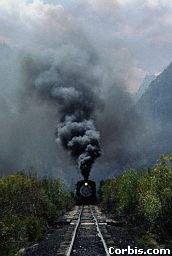
(By Michael P. Beem, Chapter member since 1999)
issues of "Sparks". I hope that you enjoy the stories and news items in this version as much as you did with
the first version. May your memories of Topeka Railroading in the late 1950's and early 1960's be a reminder
as to why the Topeka Chapter NRHS was created in the first place. Thanks and Enjoy!!! (M.B.)
(By C.C. Tinkham)---
Saturday, June 26th of centennial week in Atchison, Bill Gibson and I stepped off
Santa Fe motor train 56 at the newly dedicated Atchison Union Station. Considerable
railroad equipment was spotted nearby including Burlington's #35, 4-4-0, Santa Fe's
Cyrus K. Holliday and train, also the 811, along with the Kansas Territorial Centennial
Exhibit Car, and some modern Missouri Pacific passenger equipment. As interesting as
these exhibits were, our main objective was to ride the Cyrus K. Holliday train that
afternoon when it puffed back to Topeka. It developed that some motion pictures of the
train, to be used in a film being made for the railroad's safety department, were to be
taken. Mr. E.L. Duggan, system superintendent of safety okeyed our request with the
proviso we would stay out of camera range. Then Mr. J.F. Fenimore, superintendent
of the Eastern Division graciously provided the official sanction necessary to put us
aboard the train.
By this time the Cyrus K. Holliday was spotted next to the Santa Fe freight station
with diesel 465 providing air pressure to blow up the One Spot's fire. While the fire
was struggling to get under way, smoke eddied in and around the station in heavy,
pungent clouds. There was no doubt about the type of fuel being burned. Before long
the cry ran out that the needle had moved to show five pounds of stam pressure.
This accomplishment was heralded with an anemic bleat from the whistle which
promptly sent the needle back toward zero. It was suggested, following this disaster,
that in the future increases in steam pressure would be announced with a clang from
the bell instead of a whistle blast. After great effort on the part of the engine service
employes, enough steam was produced to operate the engine's blower. With this
achieved, progress was rapid in building up the required boiler pressure. The pops let
go about 3:45 P.M. announcing that 140 psi had been attained.
At 4:00 P.M. motor train 55 departed for Topeka. About 4:30 a special composed of
diesel 83 and 80A with three business cars left the Union Station. When it
approached the Cyrus K. Holliday and its train, the old timer started out so that movies
could be made of the two trains running side by side on parallel tracks. The special
accelerated for Topeka leaving the No. 1 behind. After ten minutes had elapsed, the
Cyrus K. whistled off and followed. The cameraman had given their instructions to
the train crew concerning locations selected for picture taking, with the first footage
being made as the train left the Atchison freight station. Mile post 2 was the next
location picked, so No. 1 put out a good show of smoke and steaming cylinder cocks
as she swept down on the grinding movie cameras at this point. By this time a number
of automobiles were following the proceedings and several amateur cameraman were
seen capturing the scene of their film. With mile post 3 came more photo taking. This
time the train was flagged down following its first run by the cameras, and was
instructed to back up for a second passing. Following this pass, uninterrupted progress
was made as far as Cummings, Kansas. Here two sequences of movies were made from
two points. These shots finished up the movie taking, allowing the train to proceed
to Topeka without further delay.
One more stop was made at Valley Falls. This time it was an operational stop to take
water. As water cranes are no longer in operation, a length of fire hose was uncoiled from
the tender and connected to a hydrant to pump water into the engine's tender. While
the engine was drinking, the crew and passengers took advantage of the stop to quench
their thirst from the water cooler in the engine cab. The two coaches behind the
Cyrus K. Holliday are not equipped with plumbing or water. (Cont. on next page--)